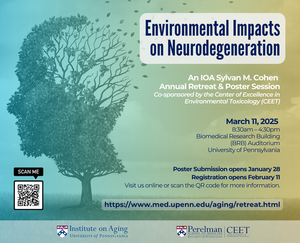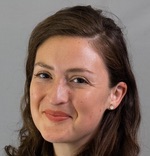 Join the Institute on Aging on Tuesday, March 11, 2025 for the Sylvan M. Cohen Annual Retreat and Poster Session. This year's retreat, "Environmental Impacts on Neurodegeneration" is co-sponsored by Penn's Center of Excellence in Environmental Toxicology (CEET).
Join the Institute on Aging on Tuesday, March 11, 2025 for the Sylvan M. Cohen Annual Retreat and Poster Session. This year's retreat, "Environmental Impacts on Neurodegeneration" is co-sponsored by Penn's Center of Excellence in Environmental Toxicology (CEET).
Event details
Date: March 11, 2025
Time: 8:30am - 4:30pm
Location: Biomedical Research Building, BRB Auditorium & Lobby
Meet the Speakers
Keynote Speakers:
 Eva-Maria Collins, PhD
Eva-Maria Collins, PhD
Associate Professor in Biology, Swarthmore College
Eva-Maria Collins, PhD, is an Associate Professor in Biology at Swarthmore College, an Adjunct Associate Professor in Neuroscience at the Perelman School of Medicine at the University of Pennsylvania, and an Affiliate Member of the Center of Excellence in Environmental Toxicology (CEET) in the Environmental Neuroscience Core. Dr. Collins is an expert in high-throughput chemical screening using freshwater planarians to identify compounds that affect neurodevelopment and neuronal function. She has pioneered the use of rapid screening in planarians as an alternative organismal model to reduce mammalian testing. Her ongoing work is funded by the CEET, NIH, NSF, and The Center for Alternatives to Animal Testing at John Hopkins University. She currently serves as a board member for the American Society for Cellular and Computational Toxicology and on the Society of Toxicology, Education and Experiential Opportunities Committee. She has published over 50 peer-reviewed articles, many of whom have been co-authored by undergraduate students trained in her laboratory. She strives to inspire the next generation of scientists and through numerous outreach activities has created opportunities for middle and high school-age students from local communities to engage with her research.
 Gary Miller, PhD
Gary Miller, PhD
Professor of Environmental Health Sciences (in Molecular Pharmacology and Therapeutics), Columbia University
Dr. Miller serves as Vice Dean for Research Strategy and Innovation, Professor of Environmental Health Sciences, Professor of Molecular Pharmacolgy and Therapeutics, and Director of the Center for Innovative Exposomics. Dr. Miller is a leader in the field of exposomics, which studies the comprehensive and cumulative effects of physical, chemical, biological, and social factors that influence biology and health. His team has been supported by NIA, NINDS, and NIEHS for his research on environmental drivers of neurodegeneration. He serves on the advisory panel of the National Institutes of Health All of Us Research Program.
Penn Presenters:
 Aimin Chen, MD, PhD
Aimin Chen, MD, PhD
Professor of Epidemiology, University of Pennsylvania
Dr. Aimin Chen is Professor of Epidemiology in the Department of Biostatistics, Epidemiology and Informatics, Perelman School of Medicine, University of Pennsylvania. He is Co-Director of Philadelphia Regional Center for Children’s Environmental Health (PRCCEH) and Associate Director of the Translational Research Support Core (TRSC) in the Center of Excellence in Environmental Toxicology (CEET) at the University of Pennsylvania. As an environmental epidemiologist, his research includes informal electronic waste recycling exposure and child development; exposure to polybrominated diphenyl ethers (PBDEs) and per- and polyfluoroalkyl substances (PFAS) and child neurobehavioral development; developmental neurotoxicity of organophosphate ester (OPE) and replacement brominated flame retardants; environmental chemical mixture exposure and child health outcomes; and environmental exposome and cognitive decline and brain MRI patterns. He has studied heavy metals, persistent organic pollutants, endocrine disrupting chemicals, and chemical mixtures. He is Associate Editor of International Journal of Hygiene and Environmental Health (IJHEH) and on the Editorial Review Board of Environmental Health Perspectives (EHP). He has served on Environmental Protection Agency (EPA) Science Advisory Board.
 Corey McMillan, PhD
Corey McMillan, PhD
Associate Professor of Neurology, University of Pennsylvania
Corey McMillan, PhD is an Associate Professor of Neurology at the University of Pennsylvania (Penn) and Co-Director of the Penn Frontotemporal Degeneration Center. He is also affiliated with several research centers at Penn including Penn Neurodegeneration Genomics Center, Population Aging Research Center, and Institute for Biomedical Informatics. His research program focuses on age-associated neurodegenerative conditions including frontotemporal degeneration (FTD) and amyotrophic lateral sclerosis (ALS) that share neuropathological and genetic features but present with a range of clinical syndromes and primary age-related tauopathy (PART) and Alzheimer’s disease (AD) that share tau pathology along a spectrum of severity. By testing biologically-grounded hypotheses with novel analytic and multimodal approaches, his lab integrates neuroimaging modalities (e.g., MRI, DTI) with genomics (e.g., SNP genotypes, RNA-seq, DNA methylation) to address the biological basis of clinical heterogeneity in neurodegenerative disease.
 Edward Lee, MD, PhD
Edward Lee, MD, PhD
Associate Professor of Pathology and Laboratory Medicine, University of Pennsylvania
Edward B. Lee, M.D., Ph.D., graduated Phi Beta Kappa from Stanford and earned his M.D. and Ph.D. from the University of Pennsylvania. After training in Anatomic Pathology and Neuropathology, he became an Assistant and then Associate Professor in the Department of Pathology and Laboratory Medicine, where he is now Co-Director of the Institute on Aging, Associate Director of the Penn Alzheimer’s Disease Research Center, Director of the Center for Neurodegenerative Disease Research Brain Bank and principal investigator of the Translational Neuropathology Research Laboratory (TNRL), which investigates Alzheimer’s disease, neurodegenerative diseases, and trauma-related brain injuries. He has made significant contributions to understanding aging-related diseases, including the discovery of vacuolar tauopathy linked to VCP mutations and the development of cryo-electron tomography to study human brain tissue. Edward is also an attending physician at the Hospital of the University of Pennsylvania, specializing in diagnostic neuropathology. With over 250 publications in top journals and an h-index of 71, he has received numerous NIH grants and awards including a Clinical Scientist Development Award from the Doris Duke Charitable Foundation. Edward serves on multiple NIH and DoD study sections and editorial boards for prominent journals. He is dedicated to training future scientists, serving on around 50 thesis committees and directing a national workshop for neuropathology trainees. His vision is to foster interdisciplinary collaboration to better understand aging and develop new therapies for aging-related diseases.
 Holly Elser, MD, PhD, MPH
Holly Elser, MD, PhD, MPH
Neurology Resident, Hospital of the University of Pennsylvania
Holly Elser, MD, PhD, MPH is a neurology resident at the Hospital of the University of Pennsylvania. She competed her MD at Stanford University School of Medicine. She earned her Master’s of Public Health (MPH) and PhD at the UC Berkeley School of Public Health, where her research focused on the health implications of occupational exposures and working environments. Her work more recently has focused on the implications of common environmental exposures for neuropsychiatric disease onset and worsening. Her recent work on wildfire smoke exposure and dementia has been featured in The Los Angeles Times, Bloomberg News, and CNN.
 Andrea Schneider, MD, PhD
Andrea Schneider, MD, PhD
Assistant Professor of Neurology, University of Pennsylvania
Andrea Schneider, MD, PhD is an Assistant Professor of Neurology in the Division of Neurocritical Care with a secondary appointment in the Department of Biostatistics, Epidemiology, and Informatics at the University of Pennsylvania Perelman School of Medicine. She received her MD in 2014 from the Johns Hopkins University School of Medicine and received her PhD in Epidemiology from the Johns Hopkins University Bloomberg School of Public Health in 2012. She completed Neurology Residency and Neurocritical Care Fellowship at Johns Hopkins Hospital in 2020. She is a neuroepidemiologist who has authored over 130 peer-reviewed publications. Her research program is centered on traumatic brain injury (TBI) epidemiology and the prevention of TBI-related sequelae, with a focus on the prevention of TBI-related neurodegeneration and dementia. Dr. Schneider is the PI of a NINDS K23 grant and three Department of Defense grants. She is the recipient of the 2023 Derek Denny-Brown Young Neurological Scholar Award in Clinical Science from the American Neurological Association and the 2023 Rising Star Award from the National Neurotrauma Society.
 Yeong Shin Yim, PhD
Yeong Shin Yim, PhD
Assistant Professor of Pharmacology, University of Pennsylvania
Dr. Yim's research focuses on the interaction between the central nervous system (CNS) and the immune system under homeostatic conditions. Her work explores how these systems communicate and influence each other, with a particular emphasis on how immune system responses to environmental stimuli can affect brain function. Dr. Yim applies this knowledge to various disease contexts, investigating how disruptions in this interplay contribute to neurological and immune-related disorders.
 Victoria Johnson, MBCHB, PhD
Victoria Johnson, MBCHB, PhD
Assistant Professor of Neurosurgery, University of Pennsylvania
Dr. Victoria E. Johnson is an Assistant Professor in the Penn Center for Brain Injury and Repair and the Dept. of Neurosurgery at the Perelman School of Medicine, University of Pennsylvania. Dr. Johnson received her medical degree and Ph.D. from the University of Glasgow, UK, before going on to complete a post-doctoral fellowship at the University of Pennsylvania. Her research interests include the biomechanical mechanisms and evolving neuropatholgical changes following traumatic brain injury (TBI), including concussion, and with a focus on diffuse brain pathologies. By studying both in vivo models and human post-mortem tissue, Dr. Johnson and colleagues have explored the potential neuropathological links between TBI and neurodegeneration.
 Sigrid Veasey, MD
Sigrid Veasey, MD
Professor of Medicine, University of Pennsylvania
Dr. Veasey is a Professor of Medicine, physician-scientist, here at Penn. Her laboratory focuses on identifying the molecular mechanisms underlying neural injury in sleep disorders and sleep disruption. Currently, a major emphasis her lab is understanding the molecular mechanisms by which sleep disruption induces irreversible neural injury including on some regions neurodegeneration. Previously sleep researchers believed that all neurobehavioral consequences of sleep loss were fully reversible upon recovery sleep. More recent work in humans shows recovery of some tasks is far more protracted. Dr. Veasey's lab has led the way in discovering that chronic short sleep and sleep fragmentation, which are common occurrences in modern society, particularly in disadvantaged neighborhoods, induce loss of wake-activated neurons, neurons essential for alertness and optimal cognitive performance. Most recently her lab has discovered that chronic sleep loss incites an amyloid cascade within locus coeruleus neurons and that this cascade leads to an unstoppable progression of tau degeneration marching throughout the forebrain and that activation of a lysosomal peptidase, asparaginyl endopeptidase is activated by sleep loss in locus coeruleus neurons and contributes to sleep loss changes in amyloid and tau and glial responses. It is hoped that identification of these molecular pathways of injury in murine models will pave the way for therapeutic strategies to prevent sleep disruption neural injury.
Registration
Registration is now open for virtual and in-person attendance. If you register to attend virtually, you will receive a Zoom link closer to the event date.
Registration deadline: March 5, 2025
Poster Session
Poster Deadlines
If you'd like your poster to be considered for a prize, you must submit a PDF in advance, no later than February 21, 2025.
All other poster submissions must be submitted no later than February 28, 2025.

